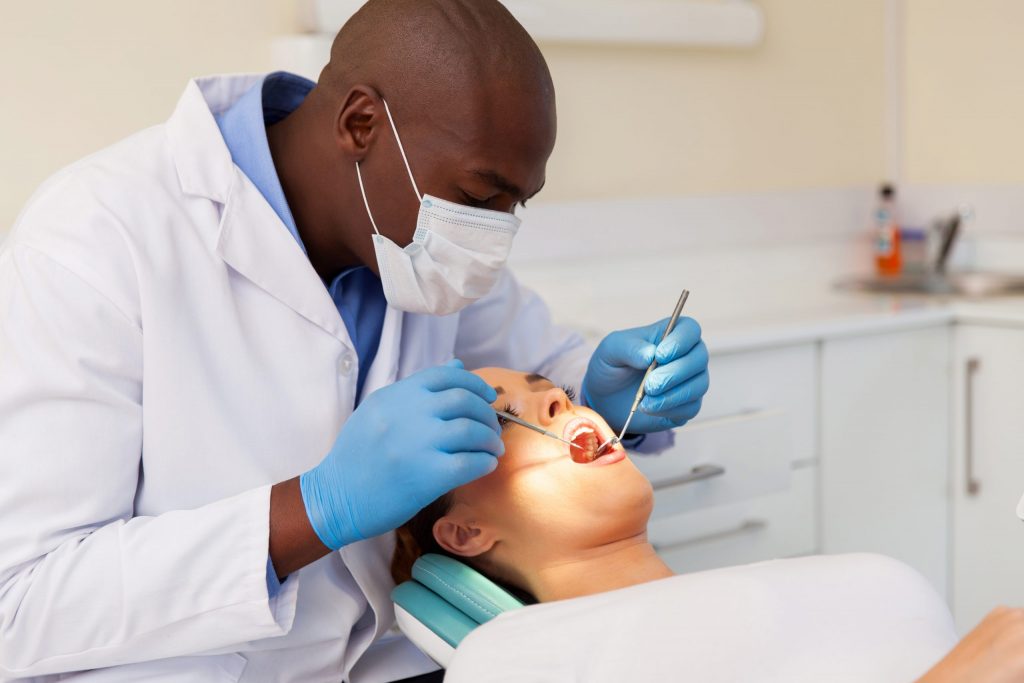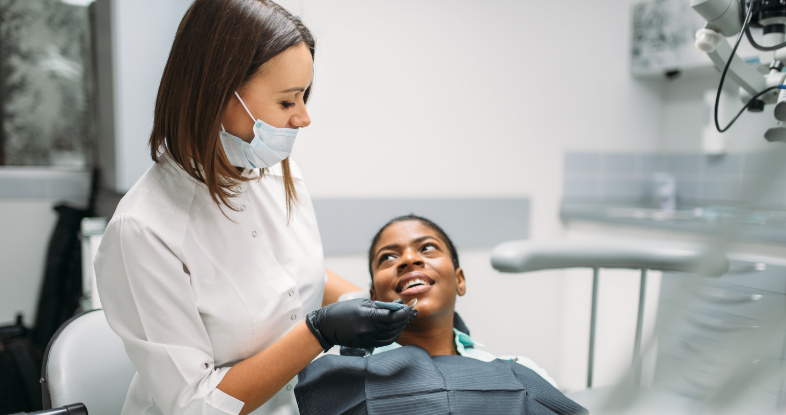Change Your Dental Experience with Same Day Dental Crown Solutions
Change Your Dental Experience with Same Day Dental Crown Solutions
Blog Article
Crucial Dental Treatment Procedures for Keeping Healthy And Balanced Teeth and Gums
Keeping optimum oral health is essential for overall health, and comprehending important oral care procedures is the very first step towards attaining this goal. Routine oral exams and professional cleansings play a pivotal function in the very early discovery of potential problems, while day-to-day practices such as brushing and flossing are essential for combating plaque and food bits.
Normal Oral Check-Ups
Routine oral examinations are crucial for maintaining optimal oral health and protecting against possible problems. These appointments usually take place every six months and offer multiple purposes, including the early detection of oral problems such as cavities, gum tissue illness, and dental cancer. By recognizing these concerns at their beginning, clients can profit from much less intrusive therapies and enhanced end results.

In addition, regular examinations provide a chance for oral experts to supply tailored guidance on dental health practices, nutritional choices, and way of life alterations that can enhance overall oral wellness. Developing a regimen of regular exams cultivates a proactive method to oral treatment, encouraging individuals to take charge of their oral health and wellness and inevitably bring about a brighter, healthier smile. Overlooking these necessary visits can lead to a lot more extreme difficulties, emphasizing their importance in preventive dental care.

Expert Cleanings
A vital element of preserving dental health and wellness is the expert cleaning done by a dental hygienist. These cleansings, typically suggested every 6 months, are necessary for the prevention of dental concerns such as tooth cavities and periodontal condition. Same Day Dental Crown. Throughout an expert cleansing, the hygienist utilizes specialized devices to get rid of plaque and tartar accumulation from the teeth and along the periodontal line, locations that routine cleaning might miss out on
The treatment starts with a comprehensive assessment of the mouth. Following this, the hygienist utilizes a scaler to thoroughly scrape away set plaque. This is commonly followed by a sprucing up treatment with an abrasive toothpaste, which helps to get rid of surface spots and smooth the enamel. The hygienist may apply a fluoride therapy to strengthen the teeth and give additional protection versus decay.
Expert cleansings not just enhance the aesthetic appeals of your smile however likewise significantly contribute to general oral health and wellness. They enable very early discovery of prospective troubles, enabling timely treatment. By focusing on these cleansings, individuals can guarantee that their dental health regimen is complemented by professional care, eventually resulting in healthier gum tissues and teeth.
Daily Brushing Techniques
Effective daily brushing methods are important for maintaining optimal dental wellness. Brushing your teeth at least two times a day, ideally in the early morning and before going to bed, is necessary for removing plaque and preventing dental caries. Pick a soft-bristled toothbrush that fits comfortably in your hand and allows easy access to all locations of your mouth.
When cleaning, hold the toothbrush at look at this site a 45-degree angle to your periodontals. This position helps to clean not just the teeth yet additionally the gumline, where plaque can gather. Usage mild, circular motions visit the site as opposed to aggressive back-and-forth strokes, which can damage the gum tissues and enamel. Make certain to comb for a minimum of two minutes, spending equal time on each quadrant of your mouth.
Do not forget to comb the internal surface areas of your teeth, in addition to your tongue, to eliminate germs and freshen your breath. If the bristles are torn, change your toothbrush every three to four months or quicker. Furthermore, take into consideration making use of fluoride tooth paste to enhance enamel and decrease the threat of decay. Developing a consistent brushing regimen will considerably contribute to the long-lasting health of your gum tissues and teeth.
Efficient Flossing Methods
Flossing is a crucial part of a detailed oral hygiene routine, playing an essential role in eliminating food bits and plaque from locations that a toothbrush can not reach. Effective flossing techniques can dramatically boost the health of your teeth and gum tissues, protecting against cavities and gum disease.
To begin, make use of around 18 inches of oral floss, winding completions around your middle fingers, allowing for better control. Hold the floss tightly in between your thumbs and index fingers, delicately guiding it in between your teeth with a sawing motion. Avoid breaking the floss, as this can cause gum damages.
As soon as the floss gets to the gum tissue line, curve it into a C shape versus one tooth and slide it underneath the periodontal line carefully, making certain to cleanse both sides of the tooth. Repeat this process for each tooth, using a tidy section of floss as you relocate from one tooth to the following.
It is recommended to floss at the very least daily, ideally prior to cleaning, to take full advantage of plaque removal. Integrating effective flossing strategies into your oral hygiene regimen will certainly add to total oral health, making it a vital practice for keeping healthy and balanced teeth and periodontals.
Nutritional Considerations for Oral Health
Numerous studies show that dietary factors to consider play a pivotal role in keeping oral health and preventing dental issues. A healthy diet plan abundant in crucial nutrients is essential for the growth and maintenance of healthy teeth and gum tissues. Key minerals and vitamins, such as phosphorus, vitamin, and calcium D, contribute considerably to the check it out toughness of tooth enamel and the general stability of the oral tooth cavity.
Foods high in antioxidants, like veggies and fruits, improve gum health and wellness by lowering inflammation and combating oxidative anxiety. Adequate hydration is important; water not only aids in the production of saliva, which counteracts acids and washes away food particles, yet additionally aids in preserving a balanced dental microbiome. Same Day Tooth Extraction.
Limiting these foods, along with practicing great oral health, is crucial for oral wellness. Thus, an all natural technique that consists of conscious dietary options can significantly add to the avoidance of dental troubles and the promo of total oral well-being.
Final Thought

These appointments commonly take place every six months and serve several purposes, including the very early discovery of oral issues such as cavities, gum disease, and dental cancer.During an examination, a dental expert performs a comprehensive assessment of the teeth, periodontals, and surrounding oral structures.In addition, normal check-ups supply a possibility for oral specialists to offer tailored advice on dental health methods, nutritional choices, and lifestyle adjustments that can enhance general dental health.In summary, maintaining healthy and balanced teeth and gum tissues requires adherence to crucial dental treatment procedures. Normal professional cleanings and oral exams promote very early detection of dental concerns and the removal of plaque and tartar, respectively.
Report this page